By Sophie Faught
MindFreedom International Communications Coordinator
In the previous MindFreedom blog, we presented some data from our Hope in Mental Health Care Survey (download the full survey summary here). This data showed that extremely negative prognoses and messages of hopelessness abound in mental health care. Often, these messages come directly from mental health providers. And very often, these messages turn out to be untrue.
Across the board for every diagnosis, a majority of respondents to part two of the survey who had received a psychiatric diagnosis and were told by a mental health provider that recovery was impossible described themselves as “recovered” or “fully recovered” (equivalent to a ranking of 8, 9, or 10 on a 10-point recovery scale).
Furthermore, many individuals who were told by a mental health provider that they would need to be on medications “for the rest of their lives” are currently not taking psychiatric medications. A significant number of them have been off psychiatric medications for at least one year.
[click to enlarge]
We ask again: why send messages of hopelessness when they are so often untrue?
Messages of Hope
There is an alternative to the hopeless prognoses and messages frequently sent by the mental health system to individuals dealing with mental or emotional distress. Recovery is possible, and respondents shared information about the strategies that helped them maintain and achieve recovery:
[click to enlarge]
Alternatives to the mental health system — including emotional healing, classes/learning, family and friends, exercise, and activism — figured prominently in the responses, and many of these alternatives were more frequently ranked as “helpful” than prescribed psychiatric medications.
Respondents also shared personal messages to individuals feeling hopeless about getting better. These were incredibly inspiring! Here are just a few:
 “Our minds, bodies and emotions are constantly in a state of trying to repair themselves and sometimes what looks and feels like “illness” is really a step toward healing and wholeness…The key is to find providers and friends, people who BELIEVE THAT YOU WILL BE WELL AGAIN!”
“Our minds, bodies and emotions are constantly in a state of trying to repair themselves and sometimes what looks and feels like “illness” is really a step toward healing and wholeness…The key is to find providers and friends, people who BELIEVE THAT YOU WILL BE WELL AGAIN!”
—Anne Costa (read more of Anne’s story here, on the I GOT BETTER website)
***
“During one of my many hospitalizations during a dark and confused period a fellow patient whom I’d never seen before looked over at me, saw my distress and said to me “It all flows back to peace” and he shook his head emphasizing “yes it does”.
Find the people who have got better and learn from them. We are living in a time when the road to recovery has been walked and marked and there are people living wanting to illuminate this for others.”
—Fred Abbe (read more of Fred’s story here, on the I GOT BETTER website)
***
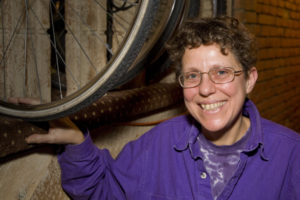 “Many of us who have been through what you’re going through are okay now, and some of us are even better than okay…
“Many of us who have been through what you’re going through are okay now, and some of us are even better than okay…
Certainly I have at times been nuts and then stopped being nuts, have been enraged and then stopped being enraged, and have been miserable and then stopped being miserable. Also… I consider myself fully recovered from the damage done me by the psychiatric industry, but I do still get crazy, enraged or miserable now and again. However, I’m much better and faster at getting through it, getting over it, and moving on.”
—Irit Shimrat (read more of Irit’s story here, on the I GOT BETTER website)
More Messages of Hope
Many more stories and messages of hope are available here and here on the I GOT BETTER website (http://igotbetter.org), and our collection is still growing. If you have a story to share, we encourage you to do so. We want to compile a body of experiential knowledge about recovery, to show that there are diverse ways to achieve balance after mental or emotional distress.
There are many ways to mental and emotional wellness. What’s yours?

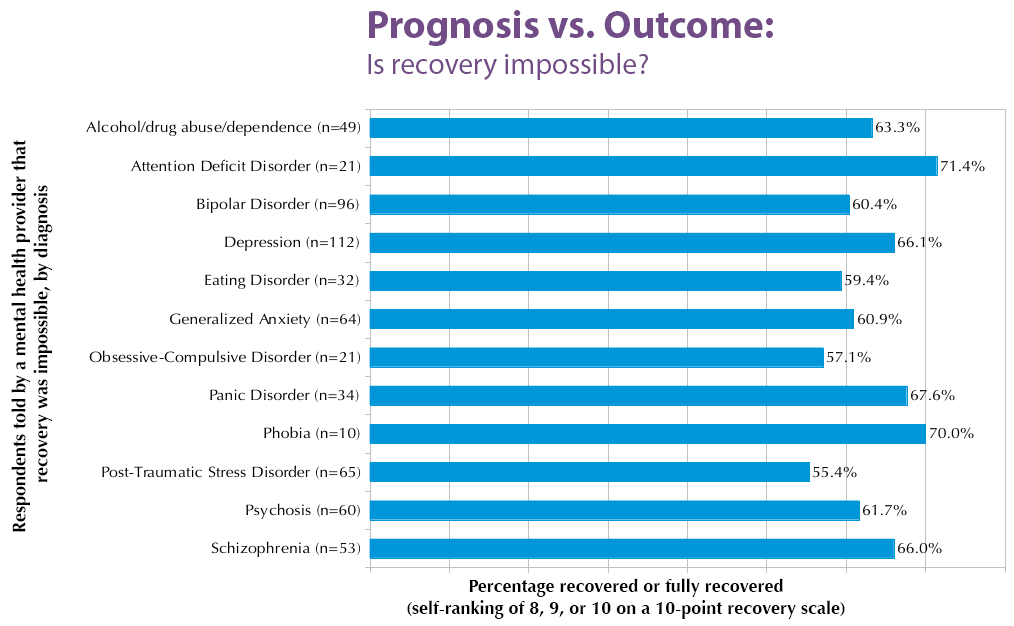
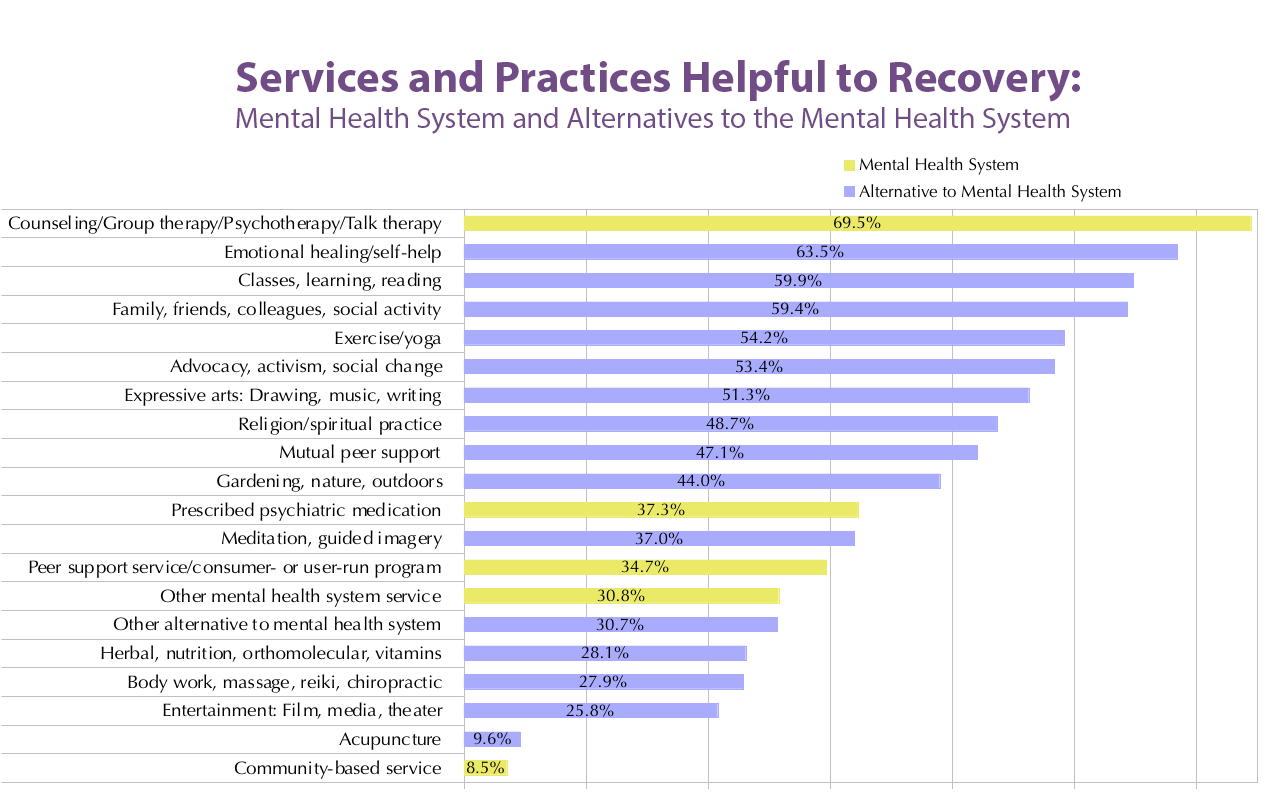


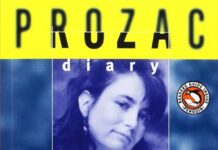











Thanks for this post! It was interesting to see that the top ranked service was talk therapy – something offered by parts of the system at least, but also de-emphasized by the parts of the system that have been taken over by the “medical model” or “disease model.”
I think therapy could rank even higher if more therapists were really trained to understand mental health issues in an open minded way, and to support a variety of ways of being mentally and emotionally well: currently there are still way too many therapists who push ideas about “mental illness” and “needing to be on medication” etc.
Report comment
While this two-part summary has been useful, I would encourage readers to reference the full report. There are so many important points made. If you are currently working in the “community mental health system” I would encourage and challenge you to bring this survey up in your next clinical staff meeting or individual/group supervision meeting for discussion.
This survey is not inconsistent with the Smith & Glass meta-analysis of 36 years ago (Smith, M. L., & Glass, G. V. (1977). Meta-analysis of psychotherapy outcome studies. American Psychologist,32,752-760). An individual’s expectations when coming in for help and the characteristics of the person(s) in the position of helping are far more important than counseling theory/technique. The great news, well at least from one point of view, is that years and years of formal training are not necessary to be an effective helper to someone experiencing distress/problems of life.
When I look at the survey, I don’t see too many services/interventions requiring an MD, PhD, or Master’s Degree with independent licensure. We all have the capacity to be an effective support/help to someone else. We always have had. It has taken a truckload of money and messaging to convince so many that that is not the case anymore.
Report comment
Hi David:)) Happy New Year!
“When I look at the survey, I don’t see too many services/interventions requiring an MD, PhD, or Master’s Degree with independent licensure. We all have the capacity to be an effective support/help to someone else. We always have had. It has taken a truckload of money and messaging to convince so many that that is not the case anymore.”
Its an incredibly important comment and observation you make here. In this age of information access via the internet, people don’t need to project a parental need onto educated experts, particularily in the field of mental health, where nobody is an expert, essentially?
IMO the need in the Doctor – Patient relationship reflects the dependant nature of being human and the struggle to indepenant maturity, and true self-awareness? A self-awareness that can be grown through the effort of self-education, unless we prefer to be told how we should be?
Its shameless self-promotion, but at the top of my blog I use the wisdom of Nelson Mandela to epitomize my own journey to recovery, through a self-education and experiential process;
“TO KNOW, THY-SELF?
“Education is the great engine of personal development. It is through education that the daughter of a peasant can become a doctor, that the son of a mine worker can become the head of the mine, that a child of farm workers can become the president of a great nation. It is what we have, not what we are given, that separates one person from another.” _Nelson Mandela.
Through the power of Self-Education, and Self-Exploration, we can come to know ourselves well, and free ourselves from the tyranny of Self-Doubt, poor Self-Regulation, and the curse of Mental-Illness.”
http://www.bipolarbatesy.blogspot.com.au/
Warm wishes,
David B.
Report comment
Thanks Batesy! Always great to read your thoughts here. Hope things are well with you and you have a great New Year as well.
Report comment
I have recovered and transformed mainly because I found out that psychiatry is such a fraud, that I did not have a diseased brain but it was severely damaged by psychiatry’s useless efforts to cure the symptoms it was causing, that I could detox safely from the poisonous drugs which were killing me, that many other people had done it also, that I was able to reconnect with music and learn many new skills, that the world was a beautiful place to be enjoyed and that I was part of it! Above all that I discovered MindFreedom International! My life has been enriched and since my own mind freedom thirteen years ago everyday since is a beautiful day! Now I feel I can determine my own life! Thanks to all the people who help me on my way!
Knowledge is power and mutual support and compassion is the essence of love!
Report comment
I so appreciate this essay and the comments; especially the one by Mary Maddock: I have recovered and transformed mainly because I found out that psychiatry is such a fraud, that I did not have a diseased brain but it was severely damaged by psychiatry’s useless efforts to cure the symptoms it was causing, that I could detox safely from the poisonous drugs which were killing me, that many other people had done it also, that I was able to reconnect with music and learn many new skills, that the world was a beautiful place to be enjoyed and that I was part of it!”
With that said the one next thing that would be most empowering would be to CHOOSE to have the labels removed from our records. That vs the idea that a “professional’ has the right to decide we are “recovered” or that we need to “remain in treatment”.
Every one of us who has escaped and done what we were (most often told) was not possible to do are at risk for forced incarceration. The way the law stands – even though I have escaped psychiatry and found my own emotional healing path and am healing from 15 years of being poisoned and lobotomized….any police officer, any hospital or for that matter any irate relative can have me “committed” and put back on the drugs simply by telling a “doctor” that I have done or said something that “concerns” them.
We will not be free until we are able to have these labels removed from our records and our human and civil rights restored.
Report comment
BEAUTIFUL SHADES of lifed experiences in journeys of recovery …
From New York Times with indicidual short videos
http://www.nytimes.com/interactive/science/lives-restored-series.html?src=tp#/marsha-linehan
Report comment
” All we want is love not force”
http://www.youtube.com/watch?v=nL4IMfF4IXI
This was sung for the first time publicly when Robert Whitaker visited Cork, Ireland.
People need to be free to live their lives as they know best to be able to let go the fear of being oppressed by those who ‘know better’! Thankfully some of us have got better but too many people fall by the wayside not of their own choosing but because the are now allowed to be themselves. They are forced over and over again to receive damaging, toxic drugs and electroshock which denies them their right to be human. The people who cannot see the harm they are causing also are denied their own humanity!
Report comment